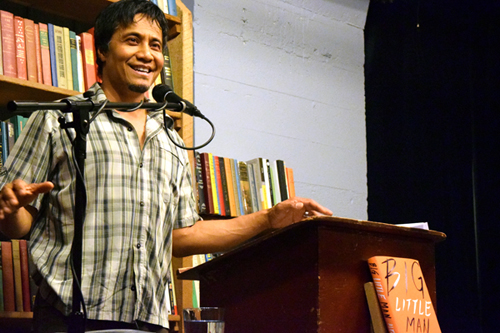By Daria Kroupoderova
Northwest Asian Weekly

Alex Tizon speaks at Elliott Bay Book Company. (Photo by Daria Kroupoderova)
In the dimly lit basement of Seattle’s Elliott Bay Book Company on the evening of June 18, Alex Tizon, author of “Big Little Man: In Search of My Asian Self,” told his audience to turn to one another and say “You’re fat!” with a genuine smile.
“Fat is good in the Philippines,” Tizon said as he told a story from his book about a trip he took to the island of Cebu in the Philippines to watch a fight.
Being well fed is a sign of privilege in the Philippines, especially in the rural areas, according to Tizon.
“Within just days of landing, a little lady came up to me and said, ‘You have a fat face’,” Tizon said as the audience burst out laughing.
He went on to describe his trip to Cebu, the different rules of behavior there, and his driver for the trip, Bobby, a man with bloodshot eyes who kept a gun in his glove compartment.
“Bobby became my only friend in Cebu for the few days I was there,” Tizon said.
Bobby drove Tizon around Cebu, showing him the city, as well as the island. He took Tizon to Mactan, a small island off Cebu.
They pulled off by the shore and Bobby pointed the Filipino way — by pressing his lips together as to give a kiss.
“It was the site of the fight I wanted to see,” Tizon said. “It’s not really accurate that I went there to see a fight. I really went there to visualize the fight…that took place about 500 years earlier.”
The fight was between Ferdinand Magellan, the 16th century explorer who tried to circumnavigate the world and claim land for Spain, and Lapu-Lapu, the leader on Mactan. Magellan and many of his men were killed in the fight, which Lapu-Lapu and his men won.
“It was important for me to see where this took place because the man who won… was the man who looked like me,” Tizon said. “That was the only reason.”
Tizon “grew up with the notion that men of Asia, golden brown men from that particular continent, didn’t win in contests with white and black men.”
Everything Tizon learned in school, saw on television, and heard around him corroborated that idea. His family came to the United States in the mid-1960s, while the Vietnam War was raging.
“When I watched the news, the faces of the enemy looked a lot like mine,” Tizon recalled. All of this created in him the notion that “men of Asia…were just lesser men.”
Tizon carried this notion around for a long time. When he was about 13 years old, he started keeping files of anything that had to do with Asia and Asian people. Looking back, Tizon said, one of the main reasons he kept these files was “to find my own worth as a man,” as was his trip to Cebu.
Tizon has been doing this personal investigation of self worth on and off for the last couple decades. “Big Little Man” features stories about his own exploration and common stereotypes of Asian men. He shared with the audience four ideas that came to him during this ongoing investigation.
The first was “history that we learn is always partial history,” Tizon said. “If you want to know the full story, you have to dig out yourself.”
Tizon pointed out that we all know who Columbus and Magellan were, but most people don’t know about the Chinese explorer Zheng, who predated Columbus. Zheng had a bigger fleet and traveled farther than Columbus.
The Chinese tried to erase any record of Zheng, which is one of the reasons why people don’t know about him.
Tizon thinks that even if most of the records weren’t destroyed, many people still wouldn’t know about him.
The next idea was that “race is just one lens,” Tizon said. There are many different ways to view the differences in life and people other than race, he added.
Tizon moved on to his next idea, which was “shame thrives in secrecy.” Tizon told a story about a friend who was 6’9” and was ashamed of how tall he was. Sometimes his friend would hunch to appear shorter.
“My shame happened to form around the issue of race in my life,” Tizon said. “When I figured out the thing I had to address was more the shame and not necessarily the race, it shifted the investigation in a different way.”
Tizon’s last point was “the antidote to feeling excluded…is not becoming more perfect.” The antidote, he said, had a lot more to do with “tuning into your purpose.” In Tizon’s case, it was his profession — journalism.
“Being in journalism allowed me tell stories of other people,” Tizon said. Turning his attention away from himself and to his stories of others helped him find his identity.
The reading ended with questions for Tizon and a book signing.
Tizon was a reporter for The Seattle Times, where he won a Pulitzer Prize in 1997 for investigative journalism, and formerly a correspondent for the Los Angeles Times. Currently, he is a journalism professor at the University of Oregon in Eugene.
Tizon’s book “Big Little Man: In Search of My Asian Self” is available at most major bookstores or online. (end)
Daria Kroupoderova can be reached at info@nwasianweekly.com.



